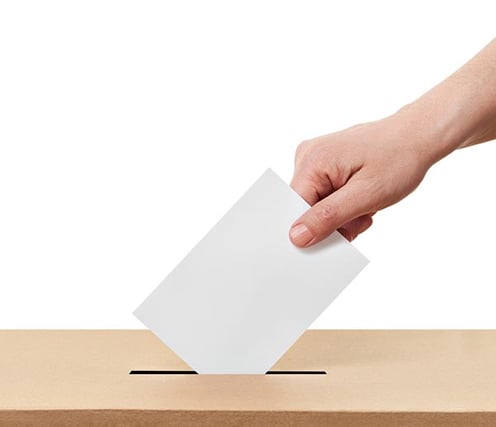HOA governing boards resemble small democracies. A community elects representatives to oversee the daily interests of the condominiums, planned unit developments, and cooperatives they serve.
Electing the right governing board is vital. Board members supervise critical infrastructure maintenance operations of the association, construct the community's budget and collect annual fees along with many other functions.
Every year, homeowner associations hold elections so the community can choose those individuals that best represent their interests. Voting should be fair and honest, but unfortunately every once in a while the election is not above board. What can homeowners do to prevent voting fraud in their communities? Our guide can assist you in identifying and stopping fraud.
Recent Cases of HOA Fraud
A few years ago, two Pennsylvania HOA association board members, Dmitry Kupershmidt and Myron Cowher, were found guilty of doctoring electoral results. Pair belonged to a Delaware community called Wild Acres Lakes.
Another case of HOA election fraud happened in 2017 in Florida. A Miami Herald and Univision 23 report found 30 percent of common-interest communities were being investigated for electoral fraud. These HOA associations were regulated by the Florida Department of Business and Professional Regulation (DBPR).
In May 2017, the state passed stringent laws requiring criminal penalties for condominium association board members that committed electoral fraud and theft of funds.
How Elections are Supposed To Work
State laws require HOA boards to outline their voting process. Organizations must list their electoral rules in the governing bylaws under their "Elections of Trustees" or "Meetings of Members" sections. It is the associations' operational responsibility to oversee fair electoral processes.
The boards cannot overreach their authority. They must establish fair rules and set realistic deadlines. The association's directors must also follow state guidelines for HOA elections.
Election Violations
Many local governments likely have general fraud laws that may apply. Not every state has laws prohibiting election fraud. California is one of a few states that criminally charge HOA boards that tamper with electoral results.
The state first regulated mutual-beneficial communities with the passage of the Davis-Stirling Common Interest Development Act in 1963. California's Civil Code §5105 lists procedures that all HOAs must follow, including elections. The statute lists penalties for violating the law. Other states have similar statutes such as the Uniform Common Interest Ownership Act. Individuals can bring cases about HOA electoral fraud before a Small Claims Court. Some violations must be argued before a Superior Court.
Violating The Davis-Stirling Act can be costly. Penalties include:
- Canceling the election results.
- Voiding any actions taken by the illegally elected board.
- Requiring the association to distribute new documents, meetings, and votes.
- Financial damages, awards, and restitution for the fraudulent use of funds.
- A $500 fine for each electoral infraction.
- Reimbursing attorney fees and legal costs.
Common Methods for Election Fraud
HOA board members can rig elections through several methods. These include:
- Proxy voting
- Voter intimidation
- Postponing meetings
- Altering ballots.
Let's discuss each of these methods and what they mean.
Rigging by Proxy
The most common method of electoral fraud is changing proxy votes. HOAs have rules in place that allow individuals to vote if they cannot be physically present at the annual meeting. If a tenant is overseas, for example, they can assign a person to vote on their behalf. This is called proxy voting.
There are two ways individuals can use proxies. General proxies are people that allow the person to freely vote on their behalf. Directed proxies are given specific instructions to vote as they instruct. Some HOAs use proxy votes to reach a quorum of votes. They can also use these ballots to rig elections.
Some mail the proxy ballots out, then recollect them from the boxes at empty homes. Others change the votes on proxy ballots to change the result in their favor.
Voter Intimidation
Some homeowner's associations visit homeowners to bully them and try to force them to vote in their favor.
Indefinitely Postponing Meetings
Another way that HOAs can rig elections is through inaction. A governing board can refuse to host an annual meeting so current members can maintain power.
Find out if your community has hosted an election within the past year. If not, you may need to take steps to stop the abuse of power.
Altering Ballots
Board members with a vested interest in the outcome of an election could change ballots. The HOA may not have an independent tabulator counting the votes from the election.
Sometimes, individuals will reprint property owners' ballots and change their votes without their permission.
Preventing Fraud: Online Voting
Transitioning to an online voting system can help reduce or eliminate voter fraud. Electronic voting, however, has its advantages and disadvantages.E-voting increases the likelihood that people will participate in an election. Homeowners can vote remotely using smartphones and computers.
Online voting will allow most HOAs boards to reach a voting quorum because more people will participate. The results are tabulated by machine, so it's harder to commit fraud. Additionally, every individual gets a unique registration code to vote.
Although the process is fairer, there remains one problem. This voting process lacks an adequate paper trail. Homeowners cannot know if the votes were changed using a script.
Additional Tips to Prevent Electoral Fraud:
Here are several tips your HOA should follow to ensure your electoral process is fair.
- Hire an attorney to examine your voting rules.
- Send electoral ballots by certified regular mail. Follow this rule, even if it's not required by your HOA's laws. It will provide a paper trail for votes. You'll also know the intended recipient received the ballot.
- Maintain updated lists of owners. Rules about who can vote should be outlined in the HOA bylaws. Usually, members should have paid their annual fees.
- Use an independent election inspector to tabulate votes. This will ensure the election is conducted fairly.
About RealManage
If you're holding an annual election for your board of directors, please consider hiring RealManage. Our Homeowners Association Management Services can help the process remains fair. For more information, contact us today.





